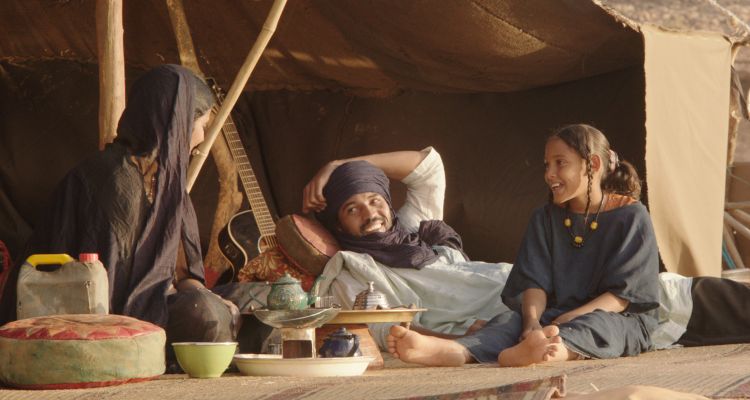 (3.5 / 5)
(3.5 / 5)
As issues go there are few more topical or red-button than Islamic fundamentalism.
Therefore it makes it all the more impressive that Abderrahmane Sissako’s new film, Timbuktu, manages to tackle it with such integrity and even humour.
A gazelle dashes through the stunted desert undergrowth. It’s only after a startling burst of gunfire that we realize it’s being pursued by armed militants on the back of a jeep. An IS flag hangs from the vehicle. Next we see them turning their AKs on an array of traditional artifacts — spindly-armed wooden men and big-breasted wooden women — lined up as if facing a firing squad. Amin Bouhafa’s score, at this point a plaintive flute melody, pays homage to these totemic victims of extremism. We’re yet to see the human cost.
The fundamentalist occupation of Timbuktu, located in Mali, West Africa, is initially portrayed as misguided and faintly absurd. Men with face scarves and automatic weapons patrol the streets, making announcements through megaphones that “women must wear socks”, and keep watch from the rooftops from amidst the satellite dishes, stopping passersby to enforce obscure new additions to the legal code. When a local imam remarks on their failure to remove their shoes while visiting a mosque they protest that they’re “doing Jihad”.
Despite this life goes on. Locals play football with an imaginary ball — the sport is banned under the occupiers’ interpretation of Sharia law — and occasionally stop the extremists in the street to call them a**holes. Out in the dunes cattle herder Kidane (Ibrahim Ahmed) lives a quiet existence with his wife, Satima (Toulou Kiki), daughter Toya (Layla Walet Mohamed), and son Issan (Mehdi Ag Mohamed). The one day Issan comes home without their prize cow, GPS. From there things quickly spill over into violence and tragedy.
Islamic fundamentalism is equally an easy issue to sensationalize and it’s to the film’s credit that Timbuktu manages the closest thing possible to a nuanced portrayal. The beetle-eyed Abdelkerim (Abel Jafri) pays official visits to Satima while Kidane is away, but his presence seems more uncertain than prurient — the punishment for adultery, after all, is death. Meanwhile, militants searching for the source of forbidden music may seem comic, but the fact is there are still armed extremists on the police, and what do they do when they find it?
Sissako’s direction picks out these grace-notes of comedy and tragedy from the confusion of ideology and everyday life. This is a world where “One cannot escape one’s fate” and God doesn’t really seem to enter into it. Brutal penance is paid for minor transgressions — a flash of a stoning is horrific in its brevity — such that the use of cell phones seems anachronistic amidst such Medieval (in)justice. Furthermore, with Islamists from so many foreign nations the blur of languages — Tamasheq, Arabic, French — mean so much goes unconveyed.
Lyrical and ironic in equal measure, Timbuktu brings to mind influences as diverse as Chris Morris and Franz Kafka — the former for Four Lions, the latter for The Trial — but Sissako’s film is subtler, less grotesque, and all the more human for it.
